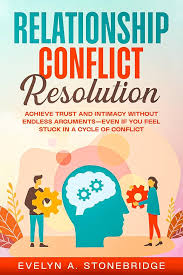How to Resolve Conflicts in a Relationship Without Losing Trust

Conflict is a natural part of any relationship, but how it is handled determines whether it strengthens or damages the bond. Resolving conflicts in a way that preserves trust requires empathy, communication, and a shared commitment to the relationship. Here’s a step-by-step guide:
1. Approach the Conflict with a Calm Mind
- Avoid addressing issues when emotions are running high. Take time to cool off before discussing the problem.
- Practice deep breathing or a short walk to regain composure.
Why it works: Reacting in the heat of the moment can escalate tensions and lead to hurtful words or actions.
2. Create a Safe Environment for Open Communication
- Choose a neutral and quiet setting where both of you feel comfortable.
- Set ground rules: no interrupting, yelling, or blame-shifting.
Why it works: A safe space fosters mutual respect and encourages honest dialogue.
3. Use “I” Statements Instead of “You” Statements
- Express your feelings without accusing or blaming.
- Example: Instead of “You never listen to me,” say, “I feel unheard when I share my thoughts.”
Why it works: “I” statements focus on your emotions, reducing defensiveness in your partner.
4. Listen Actively and Empathetically
- Give your partner your full attention. Avoid interrupting or thinking of a response while they’re talking.
- Reflect back what you hear to ensure understanding.
- Example: “It sounds like you feel upset because I didn’t consult you before making that decision.”
Why it works: Active listening shows that you value their perspective and are genuinely trying to understand.
5. Identify the Root Cause of the Conflict
- Go beyond the surface issue and uncover underlying concerns.
- Example: A fight about chores might stem from one partner feeling unappreciated.
Why it works: Addressing the root cause prevents recurring arguments over the same issue.
6. Take Responsibility for Your Part
- Acknowledge your mistakes or actions that may have contributed to the conflict.
- Example: “I realize I should have communicated better about my plans.”
Why it works: Taking responsibility fosters accountability and encourages your partner to do the same.
7. Focus on Solutions, Not Blame
- Shift the conversation toward finding a resolution.
- Brainstorm solutions together and agree on actionable steps.
- Example: “Let’s create a schedule to share responsibilities so it feels fair for both of us.”
Why it works: Solution-focused discussions rebuild trust and strengthen collaboration.
8. Reaffirm Your Commitment
- Remind each other that the goal is to strengthen the relationship, not “win” the argument.
- Example: “I love you, and I want us to work through this together.”
Why it works: Reaffirming commitment reinforces trust and emotional security.
9. Give Each Other Time to Heal
- Understand that resolving conflict doesn’t always mean immediate resolution. Allow space for reflection and emotional processing.
- Avoid pushing your partner to move on too quickly.
Why it works: Healing takes time, and patience shows respect for each other’s feelings.
10. Seek Help When Needed
- If conflicts persist or escalate, consider seeking the guidance of a therapist or counselor.
- A neutral third party can provide tools and techniques to improve communication.
Why it works: Professional guidance can help uncover deeper issues and provide strategies to move forward.
Tips to Maintain Trust During Conflict
- Be Honest: Always communicate truthfully, even when it’s difficult.
- Stay Respectful: Avoid insults, sarcasm, or dismissive behavior.
- Keep Private Matters Private: Don’t involve friends or family in your conflicts without mutual consent.
Final Thoughts
Conflicts are an opportunity to grow closer as a couple when handled with care and respect. By focusing on understanding, solutions, and mutual support, you can resolve disagreements while strengthening the trust and love in your relationship. Remember, it’s not about avoiding conflict but learning how to navigate it together.



